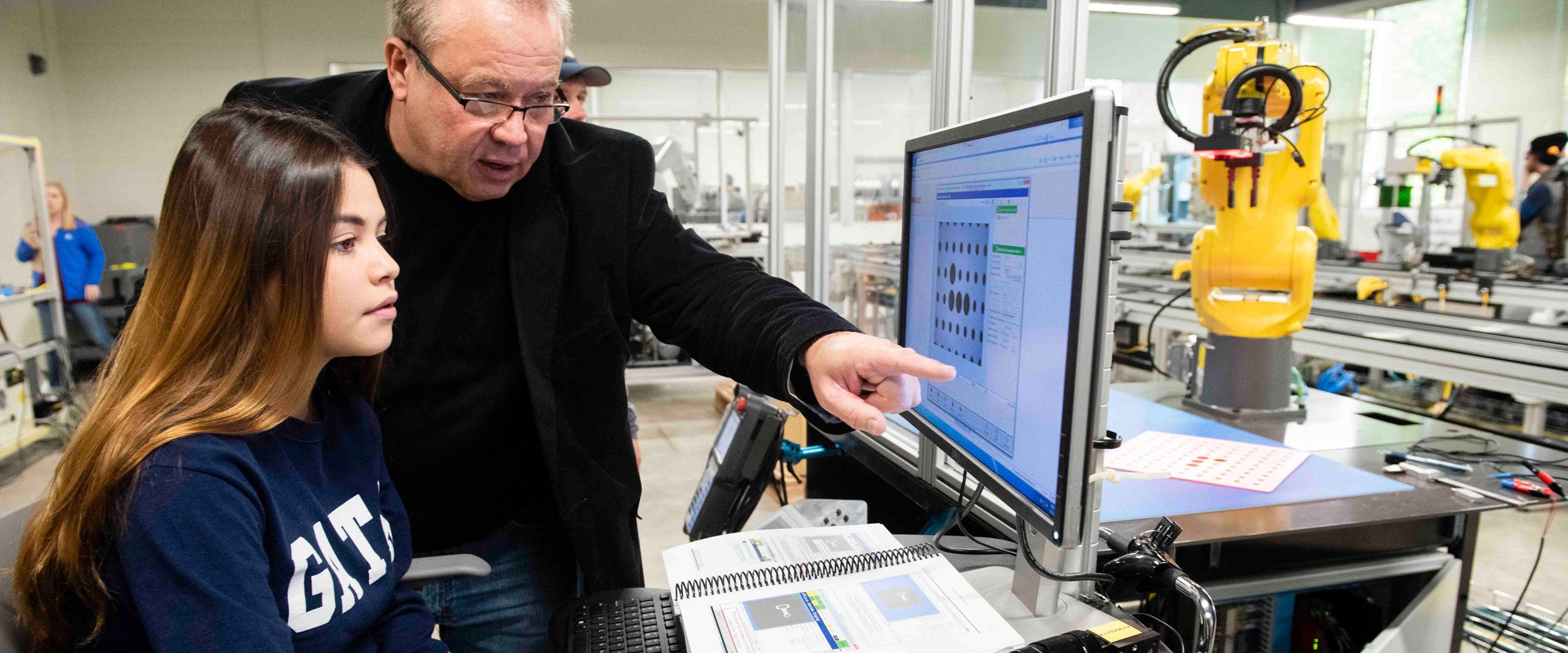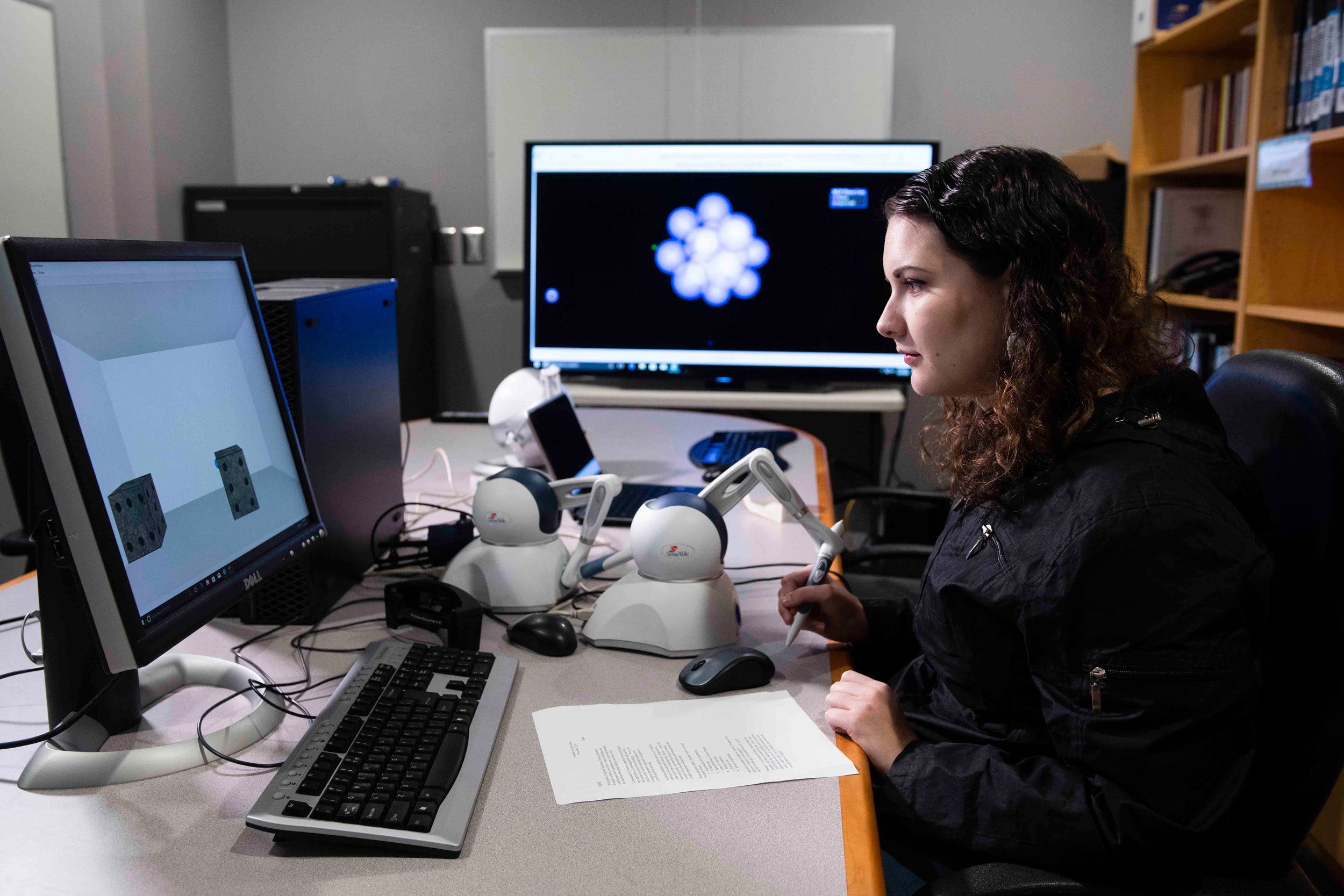Electrical engineers build all the technologies we dream about: electric cars that drive themselves, super-fast wireless networks and ever-smaller portable devices, just to name a few. Tap into the future with a Bachelor of Science (BS) in Electrical Engineering from Georgia Southern University.
Locations
- Statesboro Campus (In Person)
- Armstrong Campus (In Person, First Two Years Only)
Why Major in Electrical Engineering at Georgia Southern?
- Get instant results: Typically, all our graduates land jobs or continue their education immediately after graduation.
- Work with skilled faculty who bring real-world experience into lectures and labs.
- Study at a program accredited by the Engineering Accreditation Commission of ABET.
- High demand, high pay: Mid-career electrical engineers typically make over $100,000 a year.
- 130 credit hours to completion.
Sci-fi author Arthur C. Clarke once said, “Any sufficiently advanced technology is indistinguishable from magic.”
That statement isn’t fiction: Electrical engineers make magic happen, and you see their touch everywhere you look. They design, develop, test and create electrical and electronic equipment, such as handheld computers, wireless networks, radar, industrial and medical monitoring and control devices, navigational equipment and more. At Georgia Southern, you’ll study the theories behind the breakthroughs. Then, you’ll go from the classroom to the laboratory, where you’ll get hands-on experience bringing these concepts to life.
You’ll have a chance to grow your skills in our $60 million Engineering and Research Building, which opened in 2021. This 140,000-square-foot center houses several specialized labs home to various faculty research projects, and you’re invited to participate.
Going beyond campus, internships and co-ops with our industry partners help you see ideas in action. You’ll not only grow your record of achievements — these assignments help you establish your professional network and often lead to jobs once you graduate.
Ready to Apply?
What Can You Do With a Bachelor’s in Electrical Engineering?
As an electrical engineer, you’ll find work in all phases of product creation, from R&D to management. In addition, many Georgia Southern grads go on to advanced degrees in the field — aspiring to a specialization or adding project management to their toolkit. Salaries for electrical engineers are among the highest in the engineering field, routinely topping $100,000.
Where our graduates work:
- Digital system design and integration
- Engineering consultancy
- Engineering management
- Product design
- Research and development
What our graduates do:
- Firmware engineer
- Hardware engineer
- Network technician
- Programmer analyst
- Systems analyst
What You’ll Learn
You’ll blend classroom instruction with hands-on laboratory experience as you learn about electronics, digital communication, computer architecture, robotics, and control and electrical power systems. After completing foundational work in subjects such as calculus, physics and chemistry, you’ll study circuits, microelectronics, microcontrollers, electromagnetics and more topics. Electives allow you to look more closely at electronic warfare, electrical vehicles, cybersecurity and other up-to-the-minute applications.
See the CurriculumBuild Your Experience
Engineering is a show-me kind of profession: You solve problems and build solutions. Georgia Southern’s electrical engineering program gives you a chance to do just that.
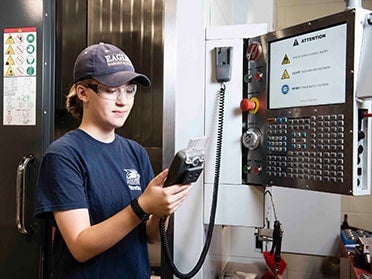
Co-ops and Internships
Combine your on-campus education with on-the-job training in either a co-op or internship. You’ll see up close the hard and soft skills employers expect — and, sometimes, walk away with a job offer.
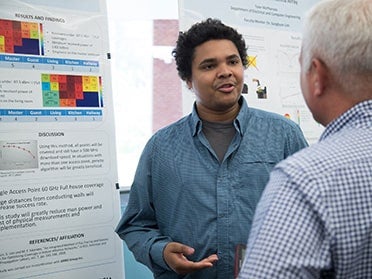
Student Research Symposium
Every year, more than 250 students show off their discoveries at our Student Research Symposium. The best projects take home more than $11,000 in prizes awarded by corporate sponsors.
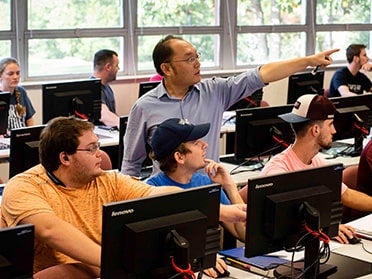
Get Involved
Connect with fellow engineering students and make professional connections through groups such as IEEE, the Robotics Club, the National Society of Black Engineers and the Society of Women Engineers.
“The engineers who interviewed me wanted to know what I had built in the lab at Georgia Southern and what equipment I had used. Having hands-on experience made a difference with Rockwell, and that experience got me the job.”
Want to Learn More?
Explore essential information about our BSEE program, including application details, accreditation status, and licensing disclosures. Gain insight into the program’s credibility and requirements to help you start your journey toward success with the knowledge you need.
Follow these steps to complete the Georgia Southern application:
- Create an application account.
- Complete our online application using the PIN you received after creating your application account.
- Once complete, pay the $30 application fee or upload a valid fee waiver. Previous Georgia Southern applicants and dual enrollment students do not need to pay the fee.
- You can check your application status at My.GeorgiaSouthern.edu/admissions three days after completing your application. This page contains live information about your admission status, including a checklist of missing documents we need to make a decision.
Credits for core courses are transferable across all schools within the University System of Georgia.
University Orientation course (FYE 1220) is still required, which is unique to Georgia Southern, for those students who transfer fewer than 30 semester credit hours.
University core capstone course (CORE 2000) is a one-hour required course; the prerequisite is 36 earned credit hours, including three hours from Area B.
Any major-specific requirements will be evaluated by the Admissions Office and/or the major department, and appropriate credit will be assigned.
Students who transfer from outside of the University System of Georgia will be evaluated by the Admission Office and/or the major department, and the appropriate transfer credit will be assigned.
Begin taking graduate coursework even before you complete your bachelor’s degree in Georgia Southern’s Accelerated Bachelor’s to Master’s Pathway. Electrical engineering majors who have earned at least 25 credit hours and maintain a 3.0 GPA are eligible to apply. You’ll finish your master’s degree in less time — so you’ll save money on tuition and launch a career with upward growth potential sooner.
About the ABM-MSEE All Accelerated Pathways at Georgia SouthernThis program is accredited by the Engineering Accreditation Commission of ABET.
The electrical engineering program at Georgia Southern will enable its graduates to do the following.
- Effectively communicate and work in cross-functional teams while conducting themselves with high standards of ethics and professional responsibility.
- Be successfully employed in the electrical engineering field or pursue relevant graduate degrees, such as in engineering, business or science.
- Be proficient in the design and implementation of electrical systems using modern tools and provide proper documentation and testing procedures.
- Draw upon a broad base of knowledge in science and engineering to provide viable solutions within the appropriate technological, global, societal, ethical and organizational context.
- Expand their capabilities and knowledge of contemporary issues through continuing education or other lifelong learning experiences, including advanced training or licensing.
Electrical engineering students are expected to possess the following skills upon graduation:
- An ability to identify, formulate and solve complex engineering problems by applying principles of engineering, science and mathematics.
- An ability to apply engineering design to produce solutions that meet specified needs with consideration of public health, safety and welfare, as well as global, cultural, social, environmental and economic factors.
- An ability to communicate effectively with a range of audiences.
- An ability to recognize ethical and professional responsibilities in engineering situations and make informed judgments, which must consider the impact of engineering solutions in global, economic, environmental and societal contexts.
- An ability to function effectively on a team whose members together provide leadership, create a collaborative and inclusive environment, establish goals, plan tasks and meet objectives.
- An ability to develop and conduct appropriate experimentation, analyze and interpret data, and use engineering judgment to draw conclusions.
- An ability to acquire and apply new knowledge as needed, using appropriate learning strategies.
Licensure in engineering falls under the authority of state licensing boards. The electrical engineering program results in a student earning “an ABET-accredited degree,” which is one of the requirements for the Professional Engineers license for all states. Other requirements include passing the Fundamentals of Engineering (FE) examination, passing the Principles & Practices of Engineering (PE) examination and engineering work experience.
If you intend to pursue professional licensing, which we recommend, we advise you to contact the state licensing board (https://ncees.org/state-links/) in the state(s) you want to become licensed to familiarize yourself with their specific requirements. Information for licensing in Georgia is available at https://sos.ga.gov/licensing-division-georgia-secretary-states-office.
Faculty Feature
Someday, a worldwide electrical supergrid may help balance the planet’s energy needs. The research behind it will come through Dr. Masoud Ansari’s Laboratory for Advanced Power and Energy Systems. He’s using a $300,000 National Science Foundation grant to get the project started.
Read More About the SupergridRelated Programs
Accreditation
The Bachelor of Science in Electrical Engineering program is accredited by the Engineering Accreditation Commission of ABET, https://www.abet.org, under the commission’s General Criteria and Program Criteria for Electrical and Similarly Named Engineering Programs.

Take the Next Step
Electrical engineers design, build and test systems as small as circuits and as large as power transmission networks. Contact us today to learn how you can get started.
Contact Us
Department of Electrical & Computer Engineering
Georgia Southern University
1100 I.T. Drive, BLDG 255
Room 1313
Statesboro, GA 30458
Phone: 912-478-5373
Fax: 912-478-0537
Email: eeng@georgiasouthern.edu
Program Contact Information
Dr. Rami Haddad
Associate Professor and Chair
Department of Electrical and Computer Engineering
Phone: 912-478-8582
Email: rhaddad@georgiasouthern.edu

